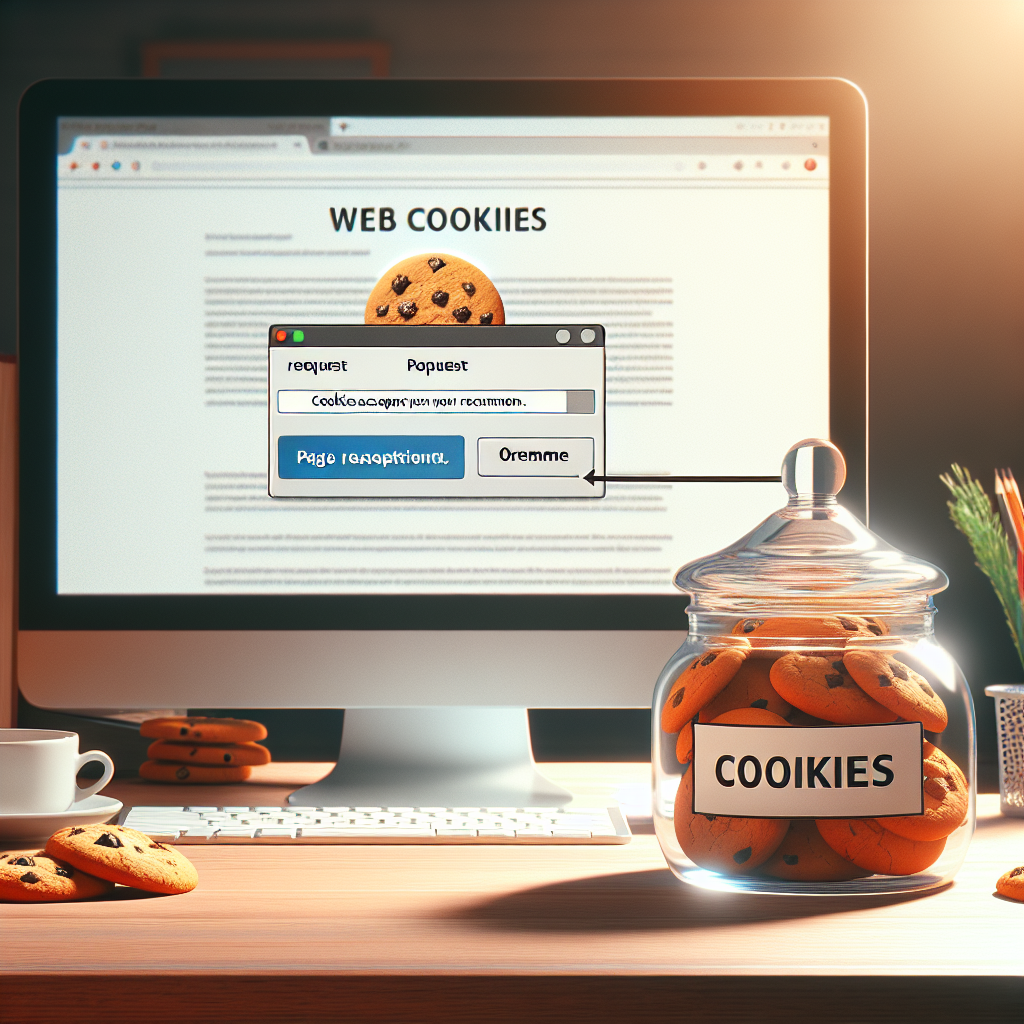The Importance of Web Cookies in Personalized Online Experiences
Web cookies, also known as HTTP cookies or browser cookies, are small pieces of data that are stored on a user’s computer by a website. These cookies are created by the website’s server and are sent to the user’s browser, where they are stored and then sent back to the server every time the user visits the website. While the concept of web cookies may seem simple, their importance in creating personalized online experiences cannot be overstated.
One of the main purposes of web cookies is to remember user preferences and settings. For example, when you visit a website and customize the layout or language, these preferences are stored in a cookie so that the next time you visit the website, it will remember your choices. This saves you time and effort, as you don’t have to constantly reset your preferences every time you visit the website.
Web cookies also play a crucial role in tracking user behavior and providing personalized recommendations. When you visit a website, the server sends a cookie to your browser that contains a unique identifier. This identifier is used to track your activity on the website, such as the pages you visit, the links you click, and the products you view. This information is then used to create a profile of your interests and preferences, which is used to provide personalized recommendations and targeted advertisements.
For example, if you frequently visit a clothing website and browse through their collection of dresses, the website’s server will use this information to show you more dresses or related products the next time you visit. This not only makes your online shopping experience more convenient, but it also helps businesses to better understand their customers and tailor their offerings accordingly.
Moreover, web cookies are essential for maintaining the security and functionality of websites. When you log into a website, a cookie is created that contains your login information. This allows you to navigate through different pages of the website without having to log in again. Without web cookies, you would have to enter your login credentials every time you click on a new page, which can be frustrating and time-consuming.
Web cookies also help websites to manage their traffic and improve their performance. For instance, if a website has a large number of visitors, cookies can be used to distribute the load among different servers, ensuring that the website runs smoothly and efficiently. Additionally, cookies can be used to identify and block malicious or suspicious activity, protecting both the website and its users from potential cyber threats.
However, while web cookies have numerous benefits, they have also been a subject of controversy and concern. Some users are wary of their online activity being tracked and their personal information being collected through cookies. To address these concerns, most websites now have a privacy policy that outlines how they use cookies and what information they collect from users. Additionally, most browsers also have options to block or delete cookies, giving users more control over their online privacy.
In conclusion, web cookies play a crucial role in creating personalized online experiences. They remember user preferences, track behavior, provide recommendations, and improve website functionality and security. While there are concerns surrounding their use, it is important to understand that cookies are an essential part of the modern internet and have greatly enhanced the way we interact with websites. As long as they are used responsibly and transparently, web cookies can greatly benefit both users and businesses.
Understanding the Privacy Concerns Surrounding Web Cookies

Web cookies, also known as HTTP cookies or browser cookies, are small pieces of data that are stored on a user’s computer by a website. These cookies are created by the website’s server and are sent to the user’s browser, where they are stored and then sent back to the server every time the user visits the website. While cookies have been around since the early days of the internet, they have become a hot topic in recent years due to privacy concerns.
Cookies serve a variety of purposes, such as remembering a user’s login information, tracking their browsing history, and personalizing their online experience. They are also used for targeted advertising, where websites use cookies to track a user’s interests and show them relevant ads. While cookies can be helpful in providing a more personalized and efficient browsing experience, they have also raised concerns about privacy and security.
One of the main concerns surrounding web cookies is the potential for them to be used to track a user’s online activity without their knowledge or consent. Cookies can be used to collect a wide range of information, including a user’s browsing history, location, and even personal information such as name and email address. This information can then be shared with third-party companies for targeted advertising or other purposes, without the user’s explicit consent.
Another concern is the potential for cookies to be used for online tracking and profiling. With the use of cookies, websites can create a unique profile of a user based on their browsing habits, interests, and personal information. This profile can then be used to target the user with specific ads or content, which can feel invasive and intrusive to some users.
Furthermore, cookies can also pose a security risk as they can be vulnerable to hacking and data breaches. If a website’s server is compromised, the cookies stored on a user’s computer can be accessed by hackers, potentially exposing sensitive information. This is especially concerning for websites that store financial or personal information, such as online banking or shopping sites.
To address these privacy concerns, many countries have implemented laws and regulations regarding the use of cookies. For example, the European Union’s General Data Protection Regulation (GDPR) requires websites to obtain explicit consent from users before using cookies for tracking and profiling purposes. This means that websites must inform users about the use of cookies and give them the option to opt-out or disable cookies altogether.
In addition to legal regulations, there are also steps that users can take to protect their privacy when it comes to cookies. One option is to regularly clear cookies from their browser, which can help prevent websites from tracking their online activity. Most browsers also have settings that allow users to block or limit the use of cookies, giving them more control over their online privacy.
However, it’s important to note that cookies also have many legitimate uses and can enhance a user’s browsing experience. For example, cookies are essential for e-commerce websites to remember a user’s shopping cart or login information. They also help websites load faster by storing information such as language preferences and website settings.
In conclusion, web cookies have become an integral part of the online experience, but they have also raised valid concerns about privacy and security. While cookies can be useful for personalization and efficiency, it’s crucial for users to be aware of their use and take necessary precautions to protect their privacy. With the implementation of laws and regulations, as well as user awareness and control, it is possible to strike a balance between the benefits and risks of web cookies.
How to Manage and Clear Web Cookies for Better Online Security
Web cookies, also known as HTTP cookies or browser cookies, are small pieces of data that are stored on a user’s computer by a website. These cookies are used to remember information about the user’s browsing activity, such as login credentials, shopping cart items, and website preferences. While cookies can be helpful in providing a personalized browsing experience, they can also pose a threat to online security. In this article, we will discuss what web cookies are and how to manage and clear them for better online security.
Firstly, it is important to understand how web cookies work. When a user visits a website, the website sends a small text file to the user’s browser, which is then stored on their computer. This file contains information about the user’s browsing activity on that particular website. The next time the user visits the same website, the browser sends the cookie back to the website, allowing it to remember the user’s preferences and provide a more personalized experience.
While cookies can be useful in providing a seamless browsing experience, they can also be used for tracking and collecting user data. This data can then be used for targeted advertising or even sold to third parties without the user’s consent. This is where the concern for online security arises.
To manage and clear web cookies, the first step is to understand how to access them. In most browsers, cookies can be found in the settings or preferences section. For example, in Google Chrome, you can access cookies by going to Settings > Advanced > Privacy and security > Site Settings > Cookies and site data. From here, you can view and manage all the cookies stored on your browser.
One way to manage web cookies is to block them altogether. However, this may result in some websites not functioning properly. Another option is to selectively block cookies from certain websites. This can be done by clicking on the “Add” button under the “Block” section in the cookies settings and entering the website’s URL. This will prevent the website from storing cookies on your browser.
Another way to manage web cookies is to set them to expire after a certain period of time. This can be done by clicking on the “Add” button under the “Clear on exit” section in the cookies settings and entering the website’s URL. This will automatically clear the cookies from that website every time you exit your browser.
In addition to managing cookies, it is also important to regularly clear them for better online security. This is especially important if you use a shared computer or if you are concerned about your online privacy. Clearing cookies will remove any stored information about your browsing activity, making it harder for websites to track your online behavior.
To clear cookies, you can go to the cookies settings in your browser and click on the “Clear browsing data” button. This will give you the option to clear cookies from a specific time period or from all time. It is recommended to clear cookies from all time to ensure maximum security.
In conclusion, web cookies are small pieces of data that are stored on a user’s computer by websites. While they can be useful in providing a personalized browsing experience, they can also pose a threat to online security. To manage and clear web cookies, users can access their browser’s cookies settings and block or set them to expire after a certain period of time. It is also important to regularly clear cookies for better online security. By understanding and managing web cookies, users can protect their online privacy and security.

